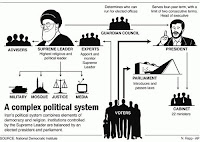War Drums Beating !

Michael S. Lofgren wrote: "For most of my three-decade career handling national security budgets in Congress, Iran was two or three years away from obtaining a nuclear weapon. The idea of an Islamic bomb exerts a peculiar fascination on American political culture and shines a searchlight on how the gross dysfunctionality of American politics emerges synergistically from the individual dysfunctions of its component parts: the military-industrial complex; oil addiction; the power of foreign-based lobbies; the apocalyptic fixation on the holy land by millions of fundamentalist Americans; U.S. elected officials' neurotic need to show toughness, especially in an election year. The rational calculus of nuclear deterrence which had guided U.S. policy during the cold war, and which the U.S. government still applies to plainly despotic and bellicose nuclear states like North Korea, has gone out the window with respect to Iran.
It is curious that the world already has over 100 Islamic bombs: those possessed by the Islamic Republic of Pakistan. It is even more curious that Pakistan may have had a maximum of 30 to 50 such weapons at the time of the September 11, 2001 terrorist attacks on this country which resulted in a shotgun marriage between Washington and Islamabad. A decade of partnership with the United States netted Pakistan about $20 billion in aid money and at least 50 more nuclear devices; anyone who knows anything about the fungibility of money will conclude that the United States partially funded Pakistan's nuclear buildup, knowingly or not. Pakistan's government has also been credibly linked to sponsorship of terrorist organizations that have operated outside its territory. But Iran, we are told, is different. A window is closing, and it is closing not in two years but in six months. And we had better leap through it before it is too late.
In the past, I have been skeptical about imminent war, e.g., in 2003-06, when the neo-conservative chickenhawks around President Bush were crowing about how "real men want to go to Teheran," meaning somebody else's husband or son should suit up and invade Iran. At the same time Seymour Hersh was churning out articles in the New Yorker about the possibility of an attack on Iran. After about the third article, I began discounting the possibility of war. But present circumstances have a different quality.
During this presidential campaign season, there is on the GOP side the most toxic warmongering political dynamic imaginable: one that makes Bush look like a pacifist in retrospect. President Obama for his part is trying to triangulate à la Bill Clinton between the GOP, a Democratic base that is mostly antiwar but politically ineffectual, Israel, the military-industrial complex, and his polling numbers. Obama may feel he can slide through the next nine months with ever-tightening sanctions and a strategy of tension short of war, but the government of Israel is attempting to force the pace with increasingly hyperbolic predictions. It is also evidently manipulating Congress (e.g., the director of Mossad meeting with the chairman of the Senate Intelligence Committee last week). Whether it is sources in Tel Aviv, sources in Washington, or both, that are feeding Iran stories to the U.S. news media is unclear. Whoever they may be, they are playing much of the press -- the Washington Post and CBS News are standout examples -- like a Stradivarius. In Pentagon-speak, this is known as "prepping the psychological battlefield."
No historical analogy is remotely close to being perfect, but in terms of the psychology of the actors, this circumstance resembles the July Crisis of 1914 and the blank check Berlin issued to its client in Vienna. Germany (per Bismarck's previous statecraft) was a sated, status quo world power that would gain nothing by war, regardless of what its neurotic and impetuous Kaiser thought. Its weaker client, Austria, was always fretting about its relative demographic decline amid a hostile Slavic sea -- does that sound familiar? Accordingly, it was constantly egging on Berlin about the "Slavic menace" that was around (and within) Austria's borders. The assassination of the Austrian Archduke Ferdinand in Sarajevo was like the Iranian nuclear program -- a red line that the Slavic (read: "Iranian") menace had crossed. Something "had" to be done, and Berlin gave its client a blank check to issue an ultimatum so extreme as to force war, a "preventive" war whose scope snowballed because of an unbroken chain of miscalculations into the First World War.
Fast forward to the present: we have roiling instability in the Middle East because of the Arab Spring (see: Egypt); an unreliable Shiite-run U.S. client state in Iraq; a borderline civil war in Syria; and U.S ambassador to the U.N. Susan Rice hectoring two world powers, China and Russia, over their Syria policy (regardless of how heinous the Syrian government's behavior is, it is not obvious that the United States will better secure the future cooperation of two permanent U.N. Security Council members by having its ambassador publicly saying these two powers' votes "disgusted" her. For that matter, how eager will Russia and China be to pull America's chestnuts out of the fire if our brinkmanship over Iran gets us into unforeseen difficulties?). And finally,the U.S. and Iran are reprising the Gulf of Tonkin in the Strait of Hormuz. All these factors compose a a brew potentially so toxic that one would think it would give even the most belligerent chickenhawk pause before quaffing it.
Washington's political class is apparently counting on the short memory of the electorate: it is barely a month and a half since we withdrew the last combat forces from Iraq, and already we have incessant agitation over Iran. America's Iraq adventure took seven years, cost 4,500 U.S. military deaths, likely well over 100,000 Iraqi civilian deaths, and sent a trillion dollars down the drain. And that one was going to be a cakewalk, remember?"



Comments